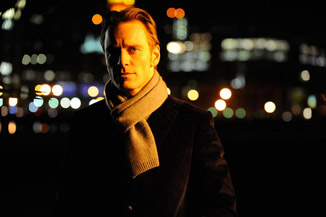Movie Review: Shame
By Matthew Huntley
December 20, 2011
BoxOfficeProphets.com

The title refers not so much to what Brandon does, but rather to the idea that he knows there's something wrong with him and still chooses not to help himself. The film views Brandon as a man who goes against nature - someone who’s incapable of intimacy and okay with it, or at least that’s what he tells himself. He excels at the superficial things in life, like looking fit, acting suave and convincing women to have one-night stands. But when it comes to hard commitments, he’s weak and powerless. It’s this duality that’s beginning to weigh on him and the time has come where he has to make a decision: either save himself or risk hitting a point of no return.
Shame is essentially about Brandon’s descending journey from confident playboy to wounded soul. The beginning of the film shows his sexual routines, which are unhealthy only because they're becoming self-destructive. He's starting to realize his tendencies are merely quick fixes to a deeper problem, and from the looks of things, he’s been using them for years, like inviting call girls up to his apartment and instructing them how to undress; frequenting live porn sites; and masturbating in the bathroom at work. Something is ailing this man, and it’s not so important what it is as long as he identifies it.
Brandon might have continued down this path were it not for his younger sister, Sissy (Carey Mulligan), suddenly showing up. She’s a struggling singer who desperately wants to be loved, or at the very least, be given attention from Brandon. Some words from her late in the film suggest they endured a difficult childhood: “We’re not bad people; we just come from a bad place.” The only difference is that Brandon learned to cope with his inner demons by hiding his emotions, staying withdrawn and avoiding relationships. Sissy’s mechanisms are more manifest and drastic, and we understand why. She knows that unless she called him, they’d never see each other, which is a painful thought.
When Sissy starts dating Brandon’s boss (James Badge Dale), Brandon is infuriated, but it gives him the gumption to ask out his colleague, Marianne (Nicole Beharie). This is one of Brandon’s first dates in a long time and we see him transform from charming and confident sexual being to nervous and insecure faintheart. Any sense of commitment scares him.
Director Steve McQueen allows this and other moments to play out in real time, which makes the whole film feel uncannily natural and authentic. The dinner scene between Brandon and Marianne is performed almost entirely in one take and much of the dialogue feels improvised, yet it’s structured enough to be relevant to the story. The camera studies them and is so focused that we pay full attention to their conversation, which, although awkward, reveals deep things about the characters’ personalities.
I’ll not reveal what happens beyond Brandon’s date, but Shame becomes an intense and uncompromising character study. The performances are practically beyond comparison. Earlier this year, Fassbender lent weight and dimension to Magneto in X-Men: First Class, and here he proves he’s the real deal, an actor capable of subtlety, extremism and everything in between. He creates one of the most complicated, multi-dimensional characters in recent memory. Mulligan is equally effective and doesn’t allow herself to be overshadowed. Like Sissy, she holds her ground during the one-on-ones with Fassbender and their scenes are riveting.
McQueen deserves a lot of credit for putting so much faith in his performers. He’s uncommonly patient with his camera, and while some scenes linger too long, we become fully immersed in what’s happening. We empathize with Brandon to the point where his struggles feel like our own, and even if the story isn’t easily identifiable, the pure filmmaking aspects of Shame mesmerize us: the long takes; the score; the moments of quiet, truthful observation. Such methods don’t seem particularly hard to pull off on a technical level, but it takes a good director to know when to use them. McQueen knows.
Is this a pleasant or easy film to watch? No, but it has an undeniable potency. Not all films have to make us feel good, or even provide hope for the characters. The best ones make us feel something and put us in someone else’s shoes so that we are transformed as viewers. Shame is that kind of film and it’s one of the year’s best.